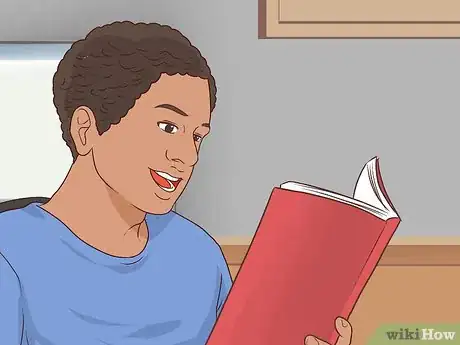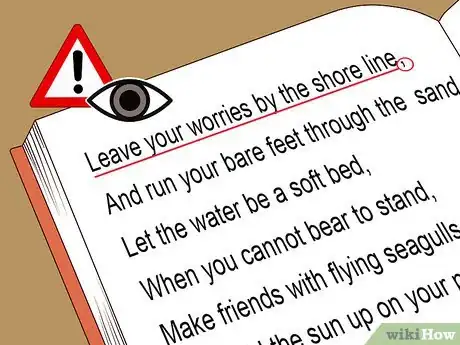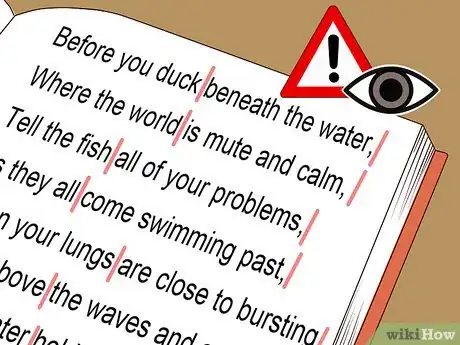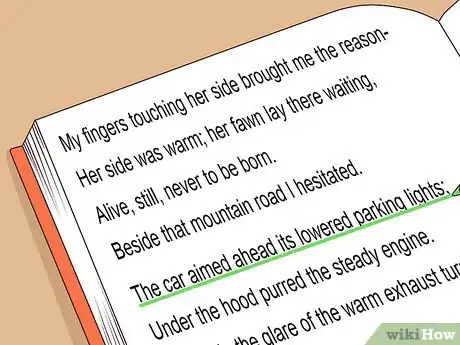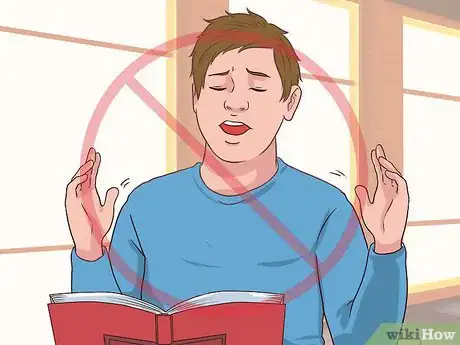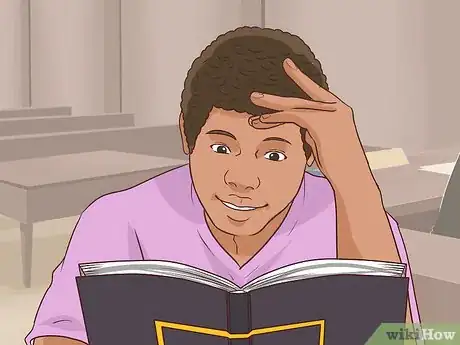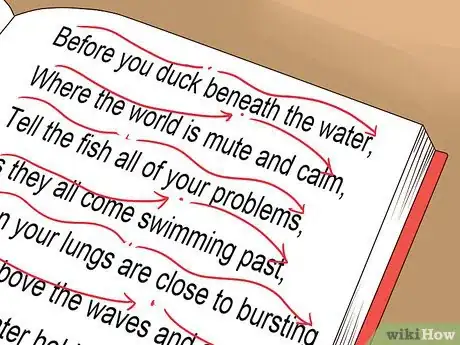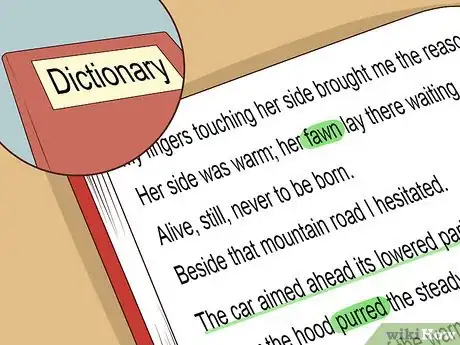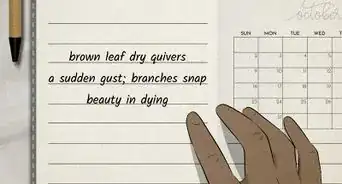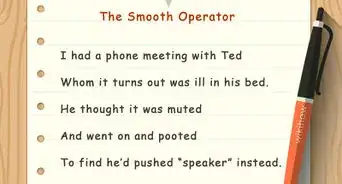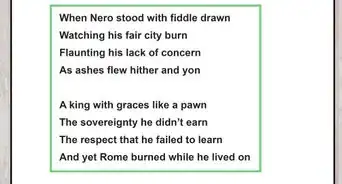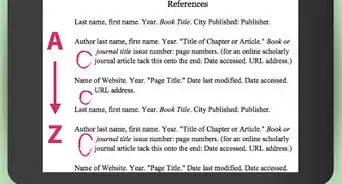X
This article was co-authored by Christopher Taylor, PhD. Christopher Taylor is an Adjunct Assistant Professor of English at Austin Community College in Texas. He received his PhD in English Literature and Medieval Studies from the University of Texas at Austin in 2014.
This article has been viewed 47,041 times.
Reading poetry out loud is an art in itself. Whether you're reading someone else's poem or your own, how you read the poem can affect the meaning. You need to take some steps to read the poem well. You'll also need to read the poem ahead of time to figure out the meaning, if possible, as well as think about your body language.
Steps
Method 1
Method 1 of 3:
Reading Clearly and Effectively
-
1Slow down. When you read out loud, particularly if you're reading in front of other people, you'll have a tendency to speed up. When you do, you'll run over the necessary stops and pauses, as well as running phrases and stanzas into each other. Slowing down will help you appreciate the feeling of the words in your mouth and each sound as it stands in relation to the rest of the poem.
-
2Pay attention to punctuation. Punctuation is carefully chosen by poets. Dashes, commas, semicolons, colons, periods, exclamation marks, and question marks all have different weight for poets. All punctuation tells you to do something. Usually, some kind of pause is appropriate, and you should take longer pauses with periods then, say, commas. In addition, though, it tells you about the tone.
- For instance, a dash often stops the poem in a way that a comma doesn't. Similarly, a sentence with a period shouldn't be read the same way as one with an exclamation mark or question mark.
Advertisement -
3Watch the lines. Line breaks mean something to a poet. When you're reading it aloud, consider why the poet might have chosen to break at that certain point. You don't always need to pause at the end of a line, but sometimes, pausing can increase the emphasis on the line.
- A very short pause is usually what's appropriate at the end of a line without punctuation.
-
4Emphasize important words. In a poem, certain words will have more punch than others. They may stand out because they seem out of place in context, but with more reflection, they add a layer of depth to the poem. Other words stand out because their connotation carries more weight than other words. Think about what stands out to you as you read the poem, and try to emphasize those words or phrases slightly with the tone and volume of your voice.[1]
- For instance, in William Stafford's poem "Traveling through the Dark," he writes about finding a deer dead on the side of the road at night. One line says, "The car aimed ahead its lowered parking lights."
- In the previous stanzas, he talks about feeling the warmth of a fawn inside the doe's body and hesitating in his next action (to push the deer into the canyon so it wouldn't cause accidents). The word "aimed" is a telling word, because it speaks of the car's indifference, as well as referencing the way the deer was likely killed, by another "aimed" car. Therefore, "aimed" is a word you might want to emphasize.[2]
-
5Remember the emotion. If you read in a monotone, your listeners are not going to connect to the poem. Try to add some emotion by varying your tone. If part of the poem is sad, try using a somber, slow tone. If it's very exciting, speed up a little and add spark to your voice.[3]
-
6Don't get too dramatic. While adding emphasis can make the poem more interesting, if you add too much, it's going to sound staged. Try to keep it more on the natural side of things. Many poems can be read in an easy, conversational tone.[4]
Advertisement
Method 2
Method 2 of 3:
Working on Your Body Language and Projection
-
1Stand up straight. When you're speaking in front of people, you need to project confidence. If you slouch or slump over, that shows a lack of confidence. Stand up straight with your shoulders back, so that you can exude confidence, even if you're not feeling confident.
- Using confident stances and body language can actually make you feel more confident, making your reading clearer.
-
2Make eye contact. If you're reading, of course you can't make eye contact all the time. However, it's important to know your poem well enough that you can look up from time to time to make eye contact with the room. It both engages the audience and helps you project confidence.
-
3Add movement as appropriate. Movement can help enhance a poem, but only if you do it sparingly and appropriately. When considering how much movement is appropriate, think about the poem itself. If it's a very serious, natural poem, you may not want to use any movement at all. If it's a more playful poem, such as Lewis Carroll's Jabberwocky, movement may be more appropriate.[5]
- You can add hand gestures, head nodding, or turn your head or body slightly. Try to only use as much movement as you normally would in a conversation.
- Don't act out every line of a poem, as that's definitely overkill.
- Try not to make nervous movements, such as wringing your hands, twirling your hair, rocking back and forth, or shifting from leg to leg.
-
4Project to the whole room. When you're in front of a crowd, make sure you are speaking to the whole room. Those people in the far back need to hear, so you often will need to speak louder than you normally do. If you're not sure how loud you need to speak, you can always ask if the people in the back can hear you.
-
5Speak distinctly. When reading to a group, you need to make sure you emphasize consonants more, particularly end consonants. When you get nervous, you'll have a tendency to rush your words, which means things will get jumbled together. Try to pronounce each word and phrase as clearly as you can.[6]
Advertisement
Method 3
Method 3 of 3:
Understanding the Poem to Maximize Your Impact
-
1Figure out the poem. Spend some time getting to know the poem. Read it through several times, and try to tease out its meaning. Some poems have clearer meanings than others, so in some cases, you may only be able to figure out a feeling or tone. Either way, you need to have some understanding of the poem before you are able to read it well.
- Understanding what the poem is about and what it means can help you read it aloud better, since you'll be telling the story rather than simply reciting the words.
- To help figure out the poem, break it down into pieces. Try ciphering out what the figurative language (imagery, alliteration, similes, metaphors, personification, irony, etc.) means in connection to the whole.
- For example, one famous poem by Langston Hughes, "Harlem," is composed of a series of similes. It starts out with "What happens to a dream deferred?" then goes through similes such as "Does it dry up / like a raisin in the sun?" The simile compares a deferred dream to a raisin, losing all life, becoming shriveled under the heat of the sun.
-
2Mark your poem. Read through the poem, and figure out what needs to be loud or soft, what need to be punched or spoken softly. Look at where you need longer pauses for emphasis. Try to mark all of these instance in your poem, then practice reading with the marked-up poem. You can use different colors if that helps.[7]
-
3Look up any words you don't know. If you don't know the word, you're not going to understand how it fits into the poem. In addition, you want to make sure you get the pronunciation right, as sound is very important to a poem. Mark the words you don't know, and then spend some time with your dictionary.[8]
-
4Consider memorizing the poem. While it's not necessary to memorize a poem to read it out loud, it can help you find a better rhythm if you memorize it. You'll be able to think about the natural flow of the poem, instead of being worried about what's coming next.[9]
Advertisement
Community Q&A
-
QuestionHow do you recite a poem?
 Christopher Taylor, PhDChristopher Taylor is an Adjunct Assistant Professor of English at Austin Community College in Texas. He received his PhD in English Literature and Medieval Studies from the University of Texas at Austin in 2014.
Christopher Taylor, PhDChristopher Taylor is an Adjunct Assistant Professor of English at Austin Community College in Texas. He received his PhD in English Literature and Medieval Studies from the University of Texas at Austin in 2014.
English Professor Reciting poetry takes practice. As you begin, make sure to speak clearly and slowly.
Reciting poetry takes practice. As you begin, make sure to speak clearly and slowly. -
QuestionAre poems meant to be read aloud?
 Christopher Taylor, PhDChristopher Taylor is an Adjunct Assistant Professor of English at Austin Community College in Texas. He received his PhD in English Literature and Medieval Studies from the University of Texas at Austin in 2014.
Christopher Taylor, PhDChristopher Taylor is an Adjunct Assistant Professor of English at Austin Community College in Texas. He received his PhD in English Literature and Medieval Studies from the University of Texas at Austin in 2014.
English Professor Many poems are written to be read aloud. The sounds of the words, when heard aloud, can contribute to your interpretation of the poem.
Many poems are written to be read aloud. The sounds of the words, when heard aloud, can contribute to your interpretation of the poem. -
QuestionHow do you begin a poem?
 Christopher Taylor, PhDChristopher Taylor is an Adjunct Assistant Professor of English at Austin Community College in Texas. He received his PhD in English Literature and Medieval Studies from the University of Texas at Austin in 2014.
Christopher Taylor, PhDChristopher Taylor is an Adjunct Assistant Professor of English at Austin Community College in Texas. He received his PhD in English Literature and Medieval Studies from the University of Texas at Austin in 2014.
English Professor Begin a poem by identifying an idea, image, event, or feeling you want to explore. Then do some freewriting to figure out what you want to say about that thing.
Begin a poem by identifying an idea, image, event, or feeling you want to explore. Then do some freewriting to figure out what you want to say about that thing.
Advertisement
References
- ↑ https://www.poetryfoundation.org/poems-and-poets/poems/detail/42775
- ↑ https://www.poetryfoundation.org/poems-and-poets/poems/detail/42775
- ↑ http://marilynsinger.net/onwriting/how-to-read-a-poem-aloud/
- ↑ https://www.loc.gov/poetry/180/p180-howtoread.html
- ↑ https://www.youtube.com/watch?v=Cca7SRzsbBw
- ↑ https://www.youtube.com/watch?v=Cca7SRzsbBw
- ↑ https://www.youtube.com/watch?v=Cca7SRzsbBw
- ↑ http://marilynsinger.net/onwriting/how-to-read-a-poem-aloud/
- ↑ https://www.theguardian.com/childrens-books-site/2015/oct/09/poetry-secrets-how-to-read-a-poem-aloud
About This Article
Advertisement
